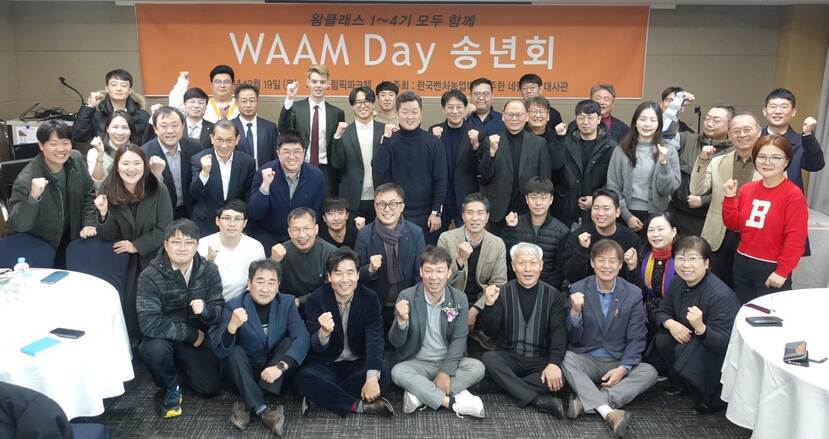Successful Korean pig farmers in the spotlight during masterclass ceremony
The Wageningen Advance Agriculture Master e-learning class (WAAM) for Korean pig farmers celebrated its fourth consecutive year with a ceremony, where farmers from all the four years gathered. The ceremony took place in Seoul. The participating pig farmers were put in the spotlight for completing the one-year e-learning masterclass. The program was led by Dr. Seung-Kyu Min and Dr. Chang-Gil Kim, who expressed their appreciation for the farmers’ dedication to the class. Rick Nobel, agricultural counsellor of LAN Seoul (the agricultural department of the Netherlands embassy in Seoul) attended the ceremony and gave a congratulatory speech, while Hojin Kang, agricultural advisor, gave a lecture about manure policy.

Background of the class
The WAAM class started in 2021, during the Covid-19 pandemic. The class was set up by Dr. Seung-Kyun Min and Dr. Robert Hoste, the latter is a pig economist from Wageningen University and Research. Dr. Chang-Gil Kim played an important role as a principal of this masterclass. The class kicked off with seven so-called Meister farmers in the first year. Meister farmers are pig farmers who reached a very professional level in farming. In the first year 18 lectures were designed by Wageningen Economic Research. The course mainly focused on enhancing production, including sessions on climate control, breeding, genetics and animal disease control. After the success of the first year, three more classes took place in the consecutive years.
Attention for animal welfare
In recent years, South Korea has seen significant societal changes regarding animal welfare, driven by growing public awareness, activism, and shifting consumer preferences. There is increasing advocacy for humane treatment of animals, stricter animal welfare laws, and a rise in ethical consumerism. For Korean pig farmers, these changes present both challenges and opportunities. Farmers face greater accountability and possible criticism if practices do not align with evolving societal norms and growing demand for ethically raised pork may require a shift in farming methods, potentially increasing costs. However, adopting welfare-friendly practices can attract premium pricing and loyalty from conscious consumers and the shift in societal attitudes toward animal welfare is pushing Korean pig farmers to adapt and innovate. The pig farmers that are part of the WAAM-class are the frontrunners when it comes to innovate pig farming in Korea, incorporating animal welfare into their farming practices. Dutch knowledge and technology plays a role in this shift through the animal welfare modules of the masterclass. Virtual farm visits have for example shown how climate control and enhanced housing systems provide a better environment for the pigs.
Celebrating success
During the WAAM celebration day in December, farmers of all four years of the WAAM-class travelled to Seoul. During the ceremony Dr. Min and Dr. Kim shared some highlights of the class, while also acknowledging how successful the masterclass has been in training the farmers. Agricultural counsellor Rick Nobel shared his thoughts on the importance and uniqueness of direct exchange between Dutch and Korean pig farmers. Hojin Kang, agricultural advisor at the embassy, presented some insights on Dutch manure policy. Mr. Kang addressed manure processing, as well as reduction in nitrogen and phosphorus surpluses and innovation leadership of the Dutch ecosystem. Overall, it was a day to celebrate the farmers’ learning process, but also the strength of international cooperation.